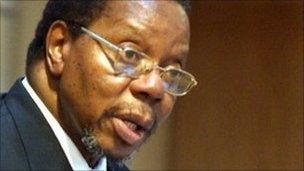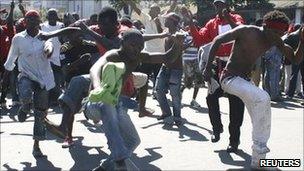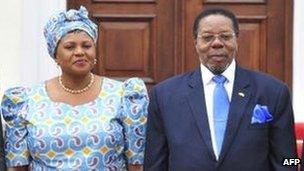Obituary: Bingu wa Mutharika, Malawi's president
- Published

President Bingu wa Mutharika won a resounding second term in office in May 2009
Bingu wa Mutharika - who died in hospital after having a cardiac arrest early on Thursday - had nursed ambitions of ruling Malawi since the dictatorship of Hastings Kamuzu Banda began to unravel in 1993.
That ambition was first realised in May 2004 - and five years later he won a second term, with a resounding victory.
But both Mr Mutharika's terms in office were mired in controversy. Critics demanded Mr Mutharika's resignation, saying he had not so much run the country as run the country into the ground.
He had been accused of trampling on democratic freedoms and economic mismanagement.
In 2011, as people struggled with rising prices and fuel shortages, frustration and anger spilled over into the streets and the country experienced some of the worst riots in its history.
At least 19 people were killed when police used live bullets.
Drama and accusations
In April 2011, he expelled the United Kingdom's representative in Malawi after a diplomatic cable was leaked in which the envoy accused Mr Mutharika of becoming increasingly autocratic and intolerant of criticism.
A few months later, Britain - then Malawi's biggest aid donor - said it was halting all direct aid to Malawi's government, accusing it of mishandling the economy and of failing to uphold human rights.

The past two years have seen massive protests against Mr Mutharika
And earlier this year, Mr Mutharika told foreign donors - on which Malawi is dependent - "to go to hell", accusing them of plotting with local groups to topple his government.
There was also plenty of domestic political drama during Mr Mutharika's years as Malawi's president.
In 2010, he expelled his deputy Joyce Banda from the ruling Democratic Progressive Party (DPP) - but had no choice but to retain her as vice-president since she was elected in 2009 as his running mate.
The pair fell out over Mr Mutharika's plans to get his brother Peter, the country's foreign minister, accepted as the DPP's presidential candidate for the 2014 elections.
Ms Banda formed her own People's Party. Under the constitution, she should take over the running of the country if Mr Mutharika dies in office.
Donor countries warned in 2005 that a power struggle between the president and his predecessor Bakili Muluzi was diverting the government's attention from pressing problems, including food shortages.
Career abroad
Mr Mutharika's career began when Mr Banda, Malawi's founding father, became president in 1964.
Mr Mutharika became the first Malawian administrator in the civil service, which was then still dominated by the British.
But during the so-called "cabinet crisis" in the same year, he fled Malawi for fear that Mr Banda would associate him with the rebellious ministers.
Mr Mutharika's studies took him to Zambia, India and the United States, where he eventually obtained a doctorate in economics.
He then began a long career as an international civil servant, working for many international bodies, including the World Bank.
During his first term, Mr Mutharika was widely praised for helping millions of the country's poor farmers by subsidising agricultural inputs. But donors then started to warn that the government could not afford such a large-scale programme and relations started to sour.
Changing names
Born Ryson Webster Thom in the southern tea-growing district of Thyolo in 1934, the schoolmaster's son adopted the more African name of Bingu Mutharika during the 1960s when pan-Africanism was sweeping across the continent.

Bingu wa Mutharika married former Tourism Minister Callista Chapola-Chimombo in 2010
He later added the prefix 'wa' between his names to disguise his identity from Mr Banda's state security, who were hunting down his opponents around the world.
In 1992 he became a founding member of the then underground political pressure group, the United Democratic Front (UDF).
The party was later transformed into a political party and eventually governed Malawi for 10 years after the first multi-party elections were organised.
Mr Mutharika's first try for the presidency was in the 1999 elections but he came last among the five candidates.
He disappeared from public view for a while but later resurfaced as a surprise presidential candidate for the UDF in 2004 after President Muluzi failed in his bid to be allowed a third term.
Mr Muluzi, who dubbed himself the "political engineer", promoted Mr Mutharika to Malawians as the "economic engineer" and did all the campaigning on behalf of his protege - so much that it was a complete surprise that the two fell out immediately after the elections.
To seal the strained relations between the two former political buddies, Mr Mutharika quit the UDF in 2005 and founded his own Democratic Progressive Party.
Mr Mutharika blamed his decision to quit the UDF on his former political associates whom he accused of frowning upon his tough anti-corruption drive.
The UDF had been in the forefront of attempts to impeach Mr Mutharika over accusations that he used state money to set up his party and other charges of going against the constitution. He denied the charges, saying they were politically motivated.
Mr Mutharika, a church-going Catholic, had four grown-up children by his Zimbabwean wife, Ethel, who died in May 2007.
In 2010, he married Callista Chapola-Chimombo, a former tourism minister.